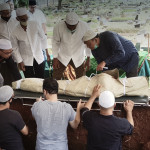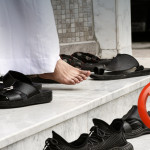الحمد لله وحده والصلاة و السلام على أشرف الخلق صلى الله عليه وسلم، أما بعد
We, the undersigned scholars and Imams, express our support for the student protests and encampments that have taught our whole society a lesson — over the past few weeks and months — in courage and integrity in standing up for the victims of genocide in Gaza.
They have not only achieved many victories in pressuring their institutions to divest from corporations and public bodies that are implicated in genocide. They have forced the voices of the Palestinians into our political discourse, by the grace of Allah.
We wish to make clear some Islamic rulings in light of some doubts and misconceptions being spread about Muslims partaking in these demonstrations and/or encampments.
Normally, these are matters of ijtihād, where we do not condemn one another. However, due to the potential harms to the wider community and the reputation of Islam as a result of Muslims being discouraged from playing a leading role, we feel it is necessary to issue this public statement.
Muslim students are highly encouraged to take part
It is highly encouraged for Muslim students to be part of these student demonstrations and encampments in particular. And generally, it is obligatory to support them in whatever way Allah has facilitated for you.
The details of their effectiveness are beyond the scope of this statement, but it suffices to say that lending your voices and presence to these protests is the bare minimum of what we must do for our duty of public inkar (condemnation) of this great munkar (manifest evil) of the genocide in Gaza.
The Messenger of Allah ﷺ said,
“If the people see an evildoer and do not stop him, soon Allah will send His punishment upon them all.” [1]
Don’t make excuses for laziness of lack of bravery
Beware of making excuses for idleness or a lack of courage to speak up for Gaza.
Do not besmirch your student Islamic societies, your Islamic identity, and the Muslim Ummah at large, in order to justify inaction or quietism by saying it is Islamically not permitted to attend.
Don’t incorrectly apply Islamic rulings from elsewhere
Do not use fatāwa from other countries — where there are different political and cultural norms pertaining to protests — and apply them incorrectly to our context.
To transfer a fatwa from somewhere else is the same as issuing a fatwa, and this can only be done by qualified people.
It is from the Sunnah to consult local scholars on local matters. This is especially considering that peaceful protests are met with violent crackdowns in some Muslim-majority countries. And thus, scholars there have to issue specific rulings considering this and their own safety and ability to speak freely.
Alhamdulillāh, that is not the case here.
You won’t be accountable for the wrong actions of others
You are not responsible, Islamically, for what other people do at these encampments or demonstrations.
You are there supporting a cause which is undoubtedly correct. Any incidental or tangential haram that might happen due to the actions of someone else is not your fault.
You are even excused from making inkar of it immediately, if it will distract from the bigger munkar (of the ongoing genocide). That is because consideration of this is part and parcel of the principles of enjoining good and forbidding evil in Islam.
When the Prophet ﷺ was in Makkah, he did not break the idols that were worshipped around the Ka’bah, but he was busy breaking them in the hearts and minds of people according to a longer-term strategy.
Bukhārī reports that Ali ibn Abi Tālib (radiy Allahu ‘anhu) said,
“Address people according to what they understand. Do you want them to deny Allah and His Messenger outright?” [2]
Not leading such encampments may increase fitnah
One of the many reasons Muslim students and Islamic societies need to be at the forefront of these demonstrations and encampments is that not doing so will likely increase different types of fitnah.
Not only will the existence of haram activities increase, but an incorrect view of Islam will be promoted as not being able to bring about justice and reduce injustice. This will lead to more and more people seeking different ideologies and discourses to resist oppression.
Islam is a comprehensive way of life and never a mere ritualistic or spiritual religion.
Take part in setting an agenda that minimises corruption
The way out of fitnah is for Muslim students and staff to be more involved and help set an agenda and norms that minimise harm as much as possible.
This is generally your Islamic obligation, not to sit back and let the harm increase.
For example, where there have been alcohol or drugs present and Muslim students and Islamic societies have requested designated areas free from these, this has been respected and accommodated.
Be patient while working with those we disagree with
While in the process of doing your Islamic duty, you will inevitably come across people or activities you disagree with.
You must be patient and perseverant while you work to build such co-operation based upon mutually beneficial agendas that respect everyone’s concerns.
The Islamic principle is,
وَتَعَاوَنُوا عَلَى الْبِرِّ وَالتَّقْوَى وَلَا تَعَاوَنُوا عَلَى الْإِثْمِ وَالْعُدْوَانِ
“And co-operate in righteousness and piety, but do not co-operate in sin and aggression,” [3]
This means it is less important who you co-operate with, and more important what you co-operate on.
The Prophet ﷺ said, about a pagan-led pact before prophethood:
“I witnessed a pact of justice in the house of Abdullah ibn Jud’an that was more precious to me than red camels. If I were called to it in Islam, I would respond.” [4]
Don’t worry about legal backlash; you are not breaking the law
Do not be concerned with backlash from the authorities, as long as you are with the broader collective of students — another reason to be involved and play a leading role in the encampments as Muslims.
The matter of “obeying the law” during these encampments is generally not an issue, since all students are important stakeholders in these public institutions that have a legal duty to allow for protest. Even disruptive ones where buildings are occupied, signs are erected, and so on — as long as there is not violence or harming people, which is fortunately the case across all encampments.
Even outside the student context, the law of the land is currently being tested, with property damage to arms manufacturers being judged recently to be proportionate considering the seriousness of the matter of genocide and killing. So student encampments are nothing to worry about.
Even if you require legal assistance due to something arising from fulfilling your duty, then it is obligatory upon the wider Muslim community to provide that.
Broader Muslim community must help these encampments
It is obligatory on the broader Muslim community to help and support these encampments however you can.
As well as legal assistance, this includes bringing food, water, moral support, and local Imams and Ulama delivering sermons and leading prayers.
Be focused upon the right intentions
Remember your intention when being present or supporting these encampments.
It is primarily to exercise a duty before Allah for supporting justice, reducing an injustice, and helping your brothers and sisters in need.
Allah says,
يَا أَيُّهَا الَّذِينَ آمَنُوا كُونُوا قَوَّامِينَ لِلَّهِ شُهَدَاءَ بِالْقِسْطِ
“O you who have believed, be persistently standing firm for Allah, witnesses in justice…” [5]
The Prophet ﷺ said,
“Whoever witnesses an evil, he must change it with his hand. If he is unable, then he must change it with this tongue. And if he is unable to do that, the least he can do as a believer is change it with his heart.” [6]
He ﷺ also said,
“Allah will remove a burden of the Day of Judgment from someone who removes an Earthly burden from his brother.” [7]
And Allah knows best.
Signed,
- Shaykh Abbas Afzal
- Shaykh Abdulfatah M. Alhadi
- Shaykh Abu Anas
- Shaykh Ahmed Hammuda
- Shaykh Ahmad Nabawi
- Shaykh Amar Shinqeeti
- Shaykh Asrar Rashid
- Shaykh Dr. Ali Ahmed
- Shaykh Bilal Toorawa
- Shaykh Fua’ad Abduh
- Shaykh Dr. Haitham al-Haddad
- Mufti Haroon Hussain
- Dr. Mohamed Gaber
- Mawlana Mohammed Waseem
- Shaykh Dr. Omer El-Hamdoon
- Shaykh Dr. Osman Latiff
- Shaykh Suliman Gani
- Dr. Mufti Yusuf Shabbir
- Shaykh Zahir Mahmood
Source: Islam21c
Notes
[1] Musnad Ahmad, 29; https://sunnah.com/ahmad:29
[2] Sahīh al-Bukhārī, 127
[3] al-Qur’ān, 5:2
[4] al-Bidāya wa al-Nihāya, Ibn Kathīr, vol. 3, p. 455
[5] al-Qur’ān, 5:8
[6] Muslim
[7] al-Bukhārī and Muslim
This joint statement was originally published by the Muslim Students for Palestine coalition, also known as MS4P.
For a live list of signatories, please visit this page.








